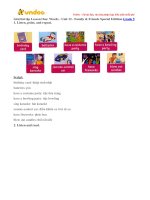Unit2 LESSON PLAN lesson1 vocabularyreading
Bạn đang xem bản rút gọn của tài liệu. Xem và tải ngay bản đầy đủ của tài liệu tại đây (40 KB, 4 trang )
LESSON PLAN – GATEWAY B1 – UNIT 2: Who did it?
Lesson 1: Vocabulary: Crimes and criminals + Reading
STAGE 1 – DESIRED OBJECTIVES
A. OBJECTIVES
By the end of this lesson, students will be able to:
1. recognize the topic of the unit and vocabulary related to crimes and criminals and
detective work;
2. identify the new vocabulary in the context;
3. show their possitive attitude to dectective work by sharing their opponion about
it;
4. identify the general and the specific ideas of 3 stories related to crimes and
detective word by skimming and scanning;
5. recognize the seriousness of crimes in the stories by comparing them;
6. show their responsibility for stoping crimes around their life.
B. LANGUAGE FOCUS
Key terms/ Vocabulary:
Key grammatical structure(s): articles
C. INSTRUCTIONAL RESOURCES
- 2 pictures of dinner ( family dinner and dinner for one)
- Video: />- Computer, projector, audio file
STAGE 2 – ASSESSMENT EVIDENCE
Performance Tasks
3. Complete grammatical tasks about articles
STAGE 3 – LEARNING PLAN/ LEARNING EXPERIENCES
Activity 1: Lead-in
- Show 2 pictures about family dinner and dinner for one.
- Ask students to describe 2 pictures and answer the following question:
1. Do you usually have meals with family or alone? How do you feel?
2. What is a true family meal?
- Elicit the answers from students.
- Lead students to the unit and the lesson.
Possible answer:
1. I usually have meals with family members. I feel very cozy and seem to be got rid
of the negative emotion. But sometimes my parents are busy and come home late, so
I usually eat out.
2. A true family meal means gathering to eat and sharing things in our life together.
Activity 2: Listening comprehension
Task 1: Matching (Task 2_Page 12)
- Have students listen and match people with their situations.
- Elicit the answers.
Task 2: True or False
- Have students listen again and complete the handout.
- Elicit the answers
Handout:
Listen to a radio programme about family dinners and decide whether the
following statements are true (T), false (F).
Statements
True False
1. Mike spends 17 hours per week on work.
2. Chris doesn’t feel disappointed about eating alone.
3. Sally said that it was necessary to have family dinners
4. Alice's family members are busy so they are reluctant to eat
together.
5. Jennifer is not happy because of eating alone tonight.
6. Daniel is unsatisfied with his family meals
Answer key:
Statements
1. Mike spends 17 hours per week on work.
2. Chris doesn’t feel disappointed about eating alone.
3. Sally said that it was necessary to have family dinners
4. Alice's family members are busy so they are reluctant to eat
together.
5. Jennifer is not happy because of eating alone tonight.
6. Daniel is unsatisfied with his family meals
True False
X
X
X
X
X
X
Task 3: Answer the questions
-. Have Ss listening again and do task 3 on page 12
- Elicit the answer.
Activity 3: Articles tasks
- Give Ss examples with articles and elicit usage of Articles “the”, “a”, “an”.
- Have Ss do the tasks on page 12 and 13 (5 tasks).
- Elicit the answer.
Activity 4: Watching video
- Have Ss watch the video and answer the quesstion:
/>Questions:
1 What is a true family dinners?
2 What are the benefits of family dinners?
- Give feedback and elicit answers.
Answer:
1.
Family dinner is not merely getting everyone fed. It includes cooking and cleaning. It
also consists of communication questions, sharing good things and one bad thing
that happened today. Make sure all members pay attention to each other.
2.
Dinners make better family relationships
Family meals lead to a healthier food choices
Eating as a family leads to better grades (conversations around the dinner table can
help boost vocabulary and public speaking skills)
Family dinners are a chance to explore new foods
Family dinners lead to greater happiness
Home made meals promote portion control
Family dinners equal healthy kids
Family dinners relieves stress
Eating at home saves money
Activity 5: Interviewing
- Have students interview their partner about the importance of family dinners.
- Give Ss some question to use:
Do you think family dinners are important to you? Why/ why not?
- Have Ss report their partner’s opinion.
- Give feedback on their performance.
Activity 6: Wrap-up & Assignments
- Ask students to answer the following questions.
1. What did you learn from the lesson today?
2. What’re the core values of the lesson?
+ The important roles of family dinners and sharing to family
- Remind students to do exercises in the workbook and to prepare for the next
lesson









